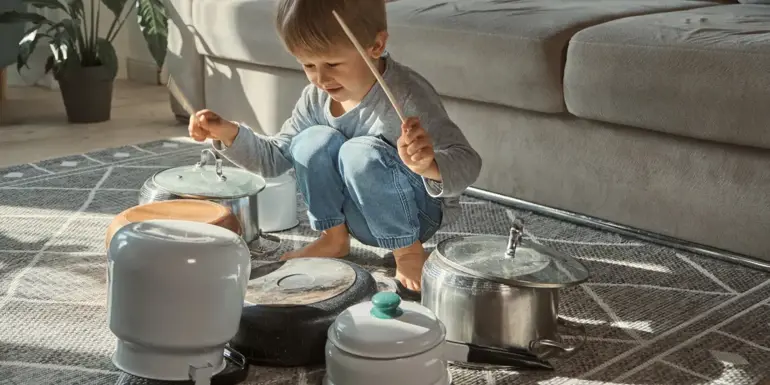Mobile devices and television screens are an easy way to keep young children entertained. Busy bodies will happily sit still watching their favourite show, and although there is educational content in lots of screen offerings, there’s plenty of evidence too, that screen time is detrimental for young brains – and behaviour.
A new study by the University of California, Davis suggests that early consumption of screen media can lead to lower self-regulation skills in preschoolers. This affects a child’s ability to control their behaviour, and plan and monitor their thoughts and feelings.
Looking ahead, the researchers say that self-regulating skills can also predict academic success, physical and mental health, income, social functioning and even criminality later in life.
For these reasons, they’re suggesting that parents hold off on introducing young children to screen media, and limit preschoolers’ use of mobile devices. The study’s primary author, Amanda C. Lawrence says, ‘Even though consumption of moderate amounts of high-quality children’s media has been established to have a positive influence on development, the current findings support limiting children’s use of mobile devices.’
This thinking is echoed in Australia, where the government recommends no screen time in the first two years of life, less than one hour per day for ages two to five, and no more than two hours for older children.
That said, COVID-19 and other life incursions have increased the amount of screen time for many children, so let’s look at ways to boost the quality of their screen engagement and find other avenues for entertainment.
What’s some new advice around screen time?
The government says that, ‘When using screen-based electronic media, positive social interactions and experiences are encouraged.’
This applies whether a child is being cared for at home or by an educator, and although screen time has increased for many children in recent months, the American Academy of Pediatrics (AAP) has issued a few tips when it comes to occupying children with screens and other activities:
- The AAP recommends that grown-ups be selective when choosing what content children can watch, with a focus on positive, educational and trusted sources. Parents are encouraged to talk to educators about the online and offline activities children can do.
- Families should make a plan, set limits and stick to routines around screen time.
- The AAP says technology should ‘not take the place of sleep, physical activity, reading, reflective down time or family connection’, and children should be challenged to practice ‘tech self-control,’ where they turn off the TV or tablet themselves.
- Children and grown-ups are encouraged to use the media together. This allows adults to monitor what littlies are learning and seeing, and bond over shared content.
- As well as offering educational games and engaging shows, media can also be used to make social connections. Specifically, video chats and social media enable children to stay in touch with family and friends in an enriching way.
- The AAP says that adults should monitor their own screen use, too. This is because children model the behaviour of their carers, and too much negative news can impact a grown-up’s stress levels and mental health.
- It’s not always easy to keep screen use to a minimum, particularly with COVID-19 changing our normal work, child care and life routines. However, limiting screen time, choosing quality screen content and having a ‘screen buddy’ are three key ways to encourage healthy technology use.
Children and technology researcher, Joanne Orlando says that quality content is interactive, educational and age appropriate, so:
- Focus on finding the apps, sites and programmes that will benefit your child
- Keep their age in mind when setting screen time boundaries and
- Remember that less is more and quality beats quantity.
What screen-free activities are great for preschoolers?
There are many ways that families and care-givers can entertain young children without a screen.
Books, scavenger hunts, nature walks, art and craft, board and card games, cooking and letterbox exchanges are all engaging activities to share with them, and things like audio books, homemade forts, activity books, play dough, DUPLO and pretend kitchens encourage a bit more independence.
When it comes to developing self-regulatory skills, Today’s Parent recommends these physical (and mental) games:
- Musical statues where the whole family or child care group must hold still when the music stops. The first person to move is eliminated and the last person standing is the winner.
- Orchestra where each person is given a percussion instrument (e.g. a tambourine, triangle, xylophone, pair of maracas or drum) and they follow the conductor, who’s armed with a pen, ruler or stick. The whole line has to follow the conductor’s tempo – and each other – to create a harmonious sound and movement.
- ‘Simon Says’ where children have to follow instructions (e.g. ‘touch your nose’) and also do the opposite (e.g. ‘don’t touch your nose’)
- Jenga where players must remove a stacked block with careful planning and slow and steady movements.
- Traffic lights where one ‘traffic cop’ faces the wall, while the other players stand in a line away from them. They advance when the cop yells ‘Green!’ and stop when ‘Red!’ is heard. If they’re moving when the cop turns around, they have to go back to the starting line, and the winner is the first person to tag the cop.
At the end of the day, it is important to limit children’s screen time. Research shows that too much – and too early – exposure to screen media can be detrimental, so let’s all think outside the square when it comes to children’s entertainment and education.
Further reading


































